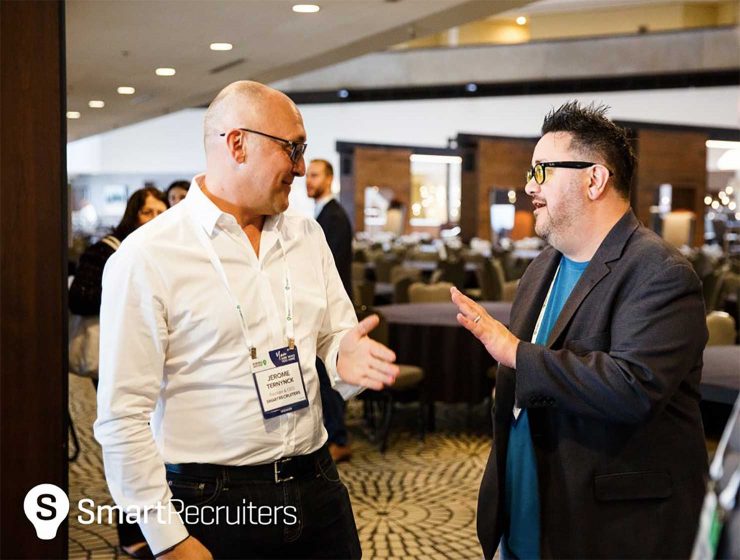There is no shortage of pros willing to wax lyrical on the latest developments in HR tech. According to RecruitingDaily President William Tincup, however, what’s more interesting is what they’re not telling us.
As head of the number-one source of HR news on the net, William Tincup straddles the confluence of HR and tech, delivering daily updates to an eager audience looking to get a grip on the constantly shifting world of recruiting. Given his unique position and experience, William writes and talks about the recruitment world with an honest objectivity that’s often lacking in a sector dominated by big name companies and endless hype.
And William doesn’t just restrict his knowledge to RecruitingDaily, he also acts on the board of advisors to numerous companies, both in the US and across the globe.
Along with many other HR thought leaders, William Tincup joined us at Hiring Success 18 to share his insights with other TA professionals who eagerly absorbed his wealth of knowledge about the recruiting industry. For those who missed out, here is a free sampling of Mr. Tincup’s musings.
What does the concept of Hiring Success mean to you?
Hiring Success, to me, is about speed to value and the longtail retention of top talent. We need to hire to our values, candidates need to convert to employees (dare I say ‘raving fans’) quickly. Employees need to add value to the firm in a rapid fashion, and the top talent needs to stay with the firm (which all starts with hiring the right people). That value chain sounds easy but we all know it’s not.
Where should “recruitment” be on a CEO’s list of priorities ?
In my experience, CEOs must establish the values, morals, and ethics of the firm, then live by them. Moreover, they must hold everyone to the same standards. Again, sounds easy, but it isn’t. How this ties to recruiting is simple: hire to your values, screen for competence and train/skill up as needed.
Who was/is your biggest professional influence and why?
Sam Walton. Humble. Brilliant. Lived by a code called Sam’s Rules.
- Motivate your partners. Money and ownership alone aren’t enough.
- Commit to your business. Believe in it more than anybody else.
- Share your profits with all your associates, and treat them as partners.
- Exceed your customers’ expectations. They’ll come back over and over.
- Celebrate your success. Find some humor in your failures. Don’t take yourself too seriously. Loosen up and everybody around you will, too.
- Control your expenses better than your competition. This is where you can always find the competitive advantage.
- Communicate everything you possibly can with your partners. The more they know, the more they’ll understand, the more they’ll care. Once they care, there’s no stopping them.
- Appreciate everything your associates do for the business. A paycheck and a stock option will buy one of a kind loyalty. But all of us like to be told how much somebody appreciates what we do for them.
- Swim Upstream. Ignore conventional wisdom. If everybody else is doing it one way, there’s a good chance you can find a niche by going in exactly the opposite direction.
- Listen to everyone in your company. And figure out ways to get them talking to the folks on the front lines… the ones who actually talk to the customer are the only ones who really know what’s going on out there.
These “rules” were developed in the 1970s, and from department managers to the CEO of Wal-Mart, they all live by them. Sadly, Sam died in 1992. The company flourished with him at the helm and also since he’s been gone. How many companies in the world can say that? How many us live by a code?

What do you think will be the defining feature of recruitment in 5 years?
Career mobility. Meaning, the ability for people to effortlessly work how, where, when, and for whom they want. Think of it in these terms. What if the players on any given sports team were decided the week before the game? Like in fantasy football, you arrange your team for the desired outcome, after “the game/project” you rearrange the team. Candidates will drive most innovation in recruitment technology.
How will they affect your average hiring manager? What will their day look like?
Adapt or die. Hiring managers need to stop thinking in myopic terms of full-time or part-time. They need to embrace the fluidity of talent. If they don’t, they run the risk of going the way of the fax machine — still kind of useful but mostly overlooked and forgotten.
Artificial intelligence is big talking point in many industries. What kind of challenges can you foresee in terms of its widespread implementation and acceptance?
Most of the discourse of AI is hype or best intentions at best. The proof in the pudding of AI is not about insight, it’s about action (which is derived from insight). It should connect the dots that I couldn’t see and then tell me what to do next. When someone can show me examples of that AI, then we’ll be on the right side of the hype wave. I personally view AI as being in the embryonic phase. It will grow up, attend Stanford, have a healthy life and add a ton of value. It’s just a bit early to be talking about Stanford while AI is still in the womb.
Do you think there are other important tech developments brewing which aren’t being spoken about?
Tons. We’ll never hear the greatest stories of recruitment, as firms are smart about what they share publicly and what is a true competitive advantage. Recruitment, if done extraordinarily well, is a defensible competitive advantage. So, why would Coke put forth the formula for Coke for anyone to copy? They don’t. They won’t. So, we’re left with the stories that can get told, where moderate innovations are made. However, anyone really great, really innovative, they’re purposely hiding from us. Probably laughing at us. Laughing at what we get wrong and how they have it figured out.
What are the most urgent problems that need to be addressed in the recruitment industry?
Real honest transparency about the positions we’re filling, the actual values of the firm, the unwritten rules of the firm, and the real work environment. Essentially, we need to be brutally honest with our candidates — herpes and all. They can handle the truth, they want and deserve the truth. The question is, are we willing to tell the truth as opposed to the Disneyland version of the job and company via — ahem — our symphonic employer branding efforts.






